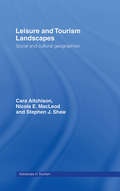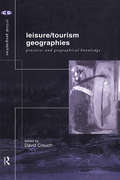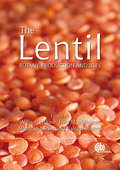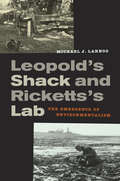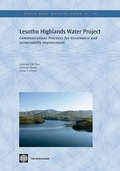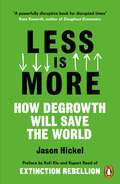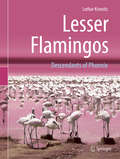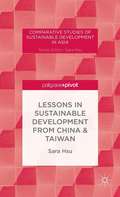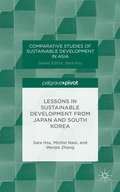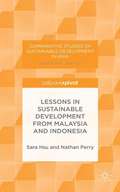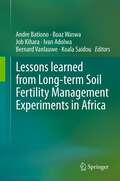- Table View
- List View
Lehmputze und ihre Anwendungen (essentials)
by Dietmar SchäferDas Buch beschäftigt sich mit dem Lehmputz und der Technologie des Lehmputzes in Europa. Es werden Gemeinsamkeiten und Unterschiede der jeweiligen Lehmputztechnologien aufgezeigt.
Lehrbuch zur Experimentalphysik Band 1: Mechanik
by Joachim HeintzeDieses Buch zur Experimentalphysik ist der erste Band der lange erwarteten Ausarbeitung der überaus beliebten Vorlesungen von Joachim Heintze. Die Liebe des Autors für die Physik und für spannende und historische Experimente ist in das Buch eingegangen und in allen Kapiteln unvermindert zu spüren.Hier finden Sie alle für das Bachelor- und das Nebenfachstudium der Physik relevanten Themen in anschaulicher und besonders gut verständlicher Form mit vielen Abbildungen präsentiert. Übungsaufgaben mit ausführlichen Lösungen erleichtern die Prüfungsvorbereitung. Ob Physik Ihr Hauptfach sein mag oder ein Begleitfach − in jedem Fall werden Sie von den klaren Erläuterungen und den eingängigen Darstellungen profitieren und vieles mitnehmen, das Sie auf Ihrem weiteren Weg begleiten wird."Möge dieses Buch dazu dienen, allen Studenten die Schönheit der Physik aufzuzeigen, Zusammenhänge zu sehen, das Studium zu erleichtern und damit dieses Vermächtnis zu erkennen und weiter zu tragen."Hans-Georg Siebig, Aus dem VorwortDer AutorJoachim Heintze studierte Physik in Berlin und an der Universität Göttingen und wurde 1953 an der Universität Heidelberg bei Otto Haxel promoviert. 1958 habilitierte er über Elektronenspinpolarisation beim Betazerfall. Danach war er einige Jahre am CERN. 1963 erhielt er mit Volker Soergel für Arbeiten zur Messung des seltenen Betazerfall des Pions den Gustav-Hertz-Preis. Ab 1964 war Heintze Professor an der Universität Heidelberg.
Leisure and Tourism Landscapes: Social and Cultural Geographies (Routledge Advances in Tourism #No.9)
by Cara Aitchison Nicola E. MacLeod Nicola E Macleod Stephen J. ShawIncreasingly significant as mediators of spatial identity and meaning, leisure, tourism, culture and heritage are only now beginning to be located within the rapidly evolving discourses of poststructuralist geographies. Exploring the influence of leisure and tourism on the production, representation and consumption of landscape, the first half of this important book focuses on different ways of ‘seeing’ or representing landscape, whereas the second half examines different forms of productive consumption in leisure and tourism. Both symbolic and material spaces of leisure and tourism are also examined in relation to urban and rural landscapes, heritage landscapes, gendered landscapes, and landscapes of sexuality and desire. With a multidisciplinary approach and a strong theoretical content which builds on poststructuralist theories, this is undoubtedly an important addition to literature in the field.
Leisure/Tourism Geographies: Practices and Geographical Knowledge (Critical Geographies #Vol. 3)
by David CrouchLeisure and Tourism Geographies considers leisure/tourism as an encounter. An encounter that exists between people, between people and space and between people and their expectations, experiences and desires.The contributors explore diverse aspects of leisure and tourism, ranging from the methodologies behind leisure practices to detailed case studies including: *Disneyland, Paris*tourism in sacred landscapes*leisure practices in cyberspace*leisure and yachting*use of recreational/holiday cottages*National Parks, local parks and gardensPresenting an exciting mix of attitudes and ideas concerning leisure and tourism, this book documents a lively debate, placing geography at its centre.
Lela and the Butterflies
by Sherri Maret Tim MaretLela loves butterflies. When Lela takes a nature walk with Ranger Maggie, she learns that butterflies need help. Lela's small steps in butterfly conservation start with a butterfly garden of nectar and host plants, but she doesn't stop there and ends up spreading her love for butterflies throughout the community. A simple guide to planting a butterfly garden is also included.
Lemurs (Animals)
by Jaclyn JaycoxLemurs are small, furry mammals with big eyes and long tails. Like humans, they are primates. These adorable animals settle their arguments with stink fights! Find out more about these curious creatures.
Lentil
by William Erskine Fred Muehlbauer Ashutosh Sarker Balram SharmaIn the last three decades, the global production of lentils has almost tripled due to larger harvest areas but also more importantly from progress in research and productivity. Chapters outline improvements in production, such as water and soil nutrient management, agronomy, mechanization and weed management. Developments in genetics and breeding are discussed alongside improved knowledge of the lentil's origin, domestication, morphology and adaptation. The implementation and impact of this new research at the farm level is also addressed as well as the crop's post-harvest processing and nutritional value.
Lentil Underground: Renegade Farmers and the Future of Food in America
by Liz CarlisleA protégé of Michael Pollan shares the story of a little known group of renegade farmers who defied corporate agribusiness by launching a unique sustainable farm-to-table food movement.<P><P> The story of the Lentil Underground begins on a 280-acre homestead rooted in America's Great Plains: the Oien family farm. Forty years ago, corporate agribusiness told small farmers like the Oiens to "get big or get out." But twenty-seven-year-old David Oien decided to take a stand, becoming the first in his conservative Montana county to plant a radically different crop: organic lentils. <P> Unlike the chemically dependent grains American farmers had been told to grow, lentils make their own fertilizer and tolerate variable climate conditions, so their farmers aren't beholden to industrial methods. Today, Oien leads an underground network of organic farmers who work with heirloom seeds and biologically diverse farm systems. Under the brand Timeless Natural Food, their unique business-cum-movement has grown into a million dollar enterprise that sells to Whole Foods, hundreds of independent natural foods stores, and a host of renowned restaurants.<P> From the heart of Big Sky Country comes this inspiring story of a handful of colorful pioneers who have successfully bucked the chemically-based food chain and the entrenched power of agribusiness's one percent, by stubbornly banding together. Journalist and native Montanan Liz Carlisle weaves an eye-opening and richly reported narrative that will be welcomed by everyone concerned with the future of American agriculture and natural food in an increasingly uncertain world.
Leopold’s Shack and Ricketts’s Lab: The Emergence of Environmentalism
by Michael J. LannooAldo Leopold and Ed Ricketts are giants in the history of environmental awareness. This illuminating book reveals the full extent of their profound and parallel influence both on science and our perception of natural world today.
Leopold’s Shack and Ricketts’s Lab: The Emergence of Environmentalism
by Michael LannooAldo Leopold and Ed Ricketts are giants in the history of environmental awareness. They were born ten years and only about 200 miles apart and died within weeks of each other in 1948. Yet they never met and they didn't read each other's work. This illuminating book reveals the full extent of their profound and parallel influence both on science and our perception of natural world today. In a lively comparison, Michael J. Lannoo shows how deeply these two ecological luminaries influenced the emergence both of environmentalism and conservation biology. In particular, he looks closely at how they each derived their ideas about the possible future of humanity based on their understanding of natural communities. Leopold and Ricketts both believed that humans cannot place themselves above earth's ecosystems and continue to survive. In light of climate change, invasive species, and collapsing ecosystems, their most important shared idea emerges as a powerful key to the future.
Lernziele und Kompetenzen im Bereich Nachhaltigkeit (Theorie und Praxis der Nachhaltigkeit)
by Walter Leal FilhoDas Buch zeigt Ihnen, wie sich Lernziele und Kompetenzen im Bereich Nachhaltigkeit ergänzen und hilft, die komplexe und vernetzte Natur der Nachhaltigkeit besser zu verstehen, und die damit verbundenen Herausforderungen zu erkennen und anzugehen. Dazu gehört auch die Vermittlung von Kenntnissen über die verschiedenen Aspekte der Nachhaltigkeit, wie z. B. ökologische, soziale und wirtschaftliche Aspekte, sowie deren Wechselwirkung miteinander. Darüber hinaus zeigt das Buch auf, wie Sie die möglichen Auswirkungen von Entscheidungen und Maßnahmen auf die Nachhaltigkeit einschätzen und bewerten können. Das Buch beschreibt die Zusammenhänge zwischen Nachhaltigkeit und Lernen. Es wird erörtert, wie Bildung und Lernen im Bereich der Nachhaltigkeit uns helfen können, die natürliche Welt und unsere Beziehung zu ihr zu verstehen und bessere Entscheidungen zu treffen, um unser Leben und die Umwelt zu verbessern. Es untersucht auch die Rolle von Technologie und Bildung im Bereich der Nachhaltigkeit und erkundet, wie Nachhaltigkeit in den Unterricht und das Lernen integriert werden kann. Schließlich enthält das Buch praktische Ratschläge zur Schaffung eines nachhaltigen Lernumfelds und zur Anwendung von Nachhaltigkeit in der Hochschulbildung und in den unteren Bildungsstufen.
Lesotho Highlands Water Project: Communication Practices for Governance and Sustainability Improvement
by Leonardo Mazzei Lawrence J. M. Haas Donal O'LearyThis paper considers the multi-faceted lessons of the Lesotho Highlands Water Project and how the project can serve as a model of mutually beneficial development, though demonstrating the benefits of a bilateral governmental cooperative approach in the development of an international river. These benefits include exceeding the impact of individual national approaches and strengthening political cooperation among all participants. This model is particularly relevant since approximately 40 percent of the world's population lives in transboundary river basins and more than 90 percent of the world's population lives within countries that share these basins.
Less Heat, More Light: A Guided Tour of Weather, Climate, and Climate Change
by John D. AberA straightforward and fact-based exploration of how weather happens, how it relates to climate, and how science answers major questions about Earth as a system Climate change is one of the most hotly contested environmental topics of our day. To answer criticisms and synthesize available information, scientists have been driven to devise increasingly complex models of the climate system. This book conveys that the basics of climate and climate change have been known for decades, and that relatively simple descriptions can capture the major features of the climate system and help the general public understand what controls climate and weather, and how both might be changing. Renowned environmental scientist and educator John D. Aber distills what he has learned from a long fascination with weather and climate, the process of science, and the telling of the story of science. This is not a book about policies and politics. Instead, it explores how weather happens, how it relates to climate, and how science has been used to answer major questions about the Earth as a system and inform policies that have reversed environmental degradation. By providing a guided tour of the science of weather, this thoughtful survey will contribute clarity and rationality to the public understanding of climate change.
Less Is More: Join the Low-Waste Movement (Orca Footprints #28)
by Leah PayneAll over the world, people are joining the low-waste movement and getting tough on their trash. Maybe you’ve heard the reports of the Great Pacific Garbage Patch swirling in the ocean. Maybe you’ve seen the photos of whales and sea birds with trash in their bellies. Or maybe you’ve heard that only 9 percent of our plastic waste actually gets recycled. We can all do our part for the planet by creating less garbage. In Less Is More young readers will discover how to avoid waste in the first place, reduce how much they use and reuse what they can, before they recycle and rot (compost) the rest. With small, simple actions we can become part of the circular economy. Find out how you can join the low-waste movement—and get your friends and family on board too!
Less is More
by Cecile Andrews Wanda Urbanska"it is a series of hard-hitting essays by a diverse collection of writers that wraps its arms around everything from simplicity to climate change to economic metrics to happiness. I approached each chapter (each new writer) with skepticism and a willingness to put the book down, and I found my self delighted time after time. This is a book anyone would be glad to have on their shlf." - Lyle Estill "Here is a book with its roots in the earth that can move you to new places, stimulate ideas and encourage change. Less is More will show you how to divest gradually, to live more in the present moment, while still paying attention to technology, health, politics and the environment. Simplicity is not a turning away. It is a rejoining." Barbara Bamberger Scott "The anthology's true strength comes in the diversity of its voices - which include not only journalists and activists, but also businesspeople and ministers. Less is More will serve as an informative and inspiring primer." - Ryan Williams, ForeWord Magazine "Andrews and Urbanska are masterful in their prose and their ability to bring together an eclectic array of writers, thinkers and sustainability adovcates who live in ways that echo what they write about. " John Ivanko "No good idea stays local for long," writes Jay Walljaspsr in Less is More, a smart collection of essays that chant the simplicity mantra without oversimpifying the issues at stake. Many of these ideas seem bound to travel far." - Utne Reader "I am both educated and inspired by the writings in Less is More. Living simply, like finding the heart, is the work of a lifetime. It is not easy to get there, but it provides a life of ease once the goal is reached. This book is a wonderful contribution to reorienting our lives away from the alienating influences of our shame-inducing consumer culture back toward what is really important: the choice to care for ourselves, others and the planet in a simple, loving way." - Glenn Berger, PhD, glennbergerblog People are afraid and anxious. We're destroying the planet, undermining happiness, and clinging to an unsustainable economy. Our obsessive pursuit of wealth isn't working. But there's another way. Less can be More. Throughout history wise people have argued that we need to live more simply--that only by limiting outer wealth can we have inner wealth. Less is More is a compelling collection of essays by people who have been writing about simplicity for decades. They bring us a new vision of Less: less stuff, less work, less stress, less debt. A life with Less becomes a life of More: more time, more satisfaction, more balance, and more security. When we have too much, we savor nothing. When we choose less, we regain our life and can think and feel deeply. Ultimately, a life of less connects us with one true source of happiness: being part of a caring community. Less is More shows how to turn individual change into a movement that leads to policy changes in government and corporate behavior, work hours, the wealth gap, and sustainability. It will appeal to those who want to take back their lives, their planet, and their well-being.
Less is More: How Degrowth Will Save the World
by Jason Hickel'A powerfully disruptive book for disrupted times ... If you're looking for transformative ideas, this book is for you.' KATE RAWORTH, economist and author of Doughnut EconomicsA Financial Times Book of the Year______________________________________Our planet is in trouble. But how can we reverse the current crisis and create a sustainable future? The answer is: DEGROWTH.Less is More is the wake-up call we need. By shining a light on ecological breakdown and the system that's causing it, Hickel shows how we can bring our economy back into balance with the living world and build a thriving society for all. This is our chance to change course, but we must act now.______________________________________'A masterpiece... Less is More covers centuries and continents, spans academic disciplines, and connects contemporary and ancient events in a way which cannot be put down until it's finished.' DANNY DORLING, Professor of Geography, University of Oxford'Jason is able to personalise the global and swarm the mind in the way that insects used to in abundance but soon shan't unless we are able to heed his beautifully rendered warning.' RUSSELL BRAND'Jason Hickel shows that recovering the commons and decolonizing nature, cultures, and humanity are necessary conditions for hope of a common future in our common home.' VANDANA SHIVA, author of Making Peace With the Earth'This is a book we have all been waiting for. Jason Hickel dispels ecomodernist fantasies of "green growth". Only degrowth can avoid climate breakdown. The facts are indisputable and they are in this book.' GIORGIS KALLIS, author of Degrowth'Capitalism has robbed us of our ability to even imagine something different; Less is More gives us the ability to not only dream of another world, but also the tools by which we can make that vision real.' ASAD REHMAN, director of War on Want'One of the most important books I have read ... does something extremely rare: it outlines a clear path to a sustainable future for all.' RAOUL MARTINEZ, author of Creating Freedom'Jason Hickel takes us on a profound journey through the last 500 years of capitalism and into the current crisis of ecological collapse. Less is More is required reading for anyone interested in what it means to live in the Anthropocene, and what we can do about it.' ALNOOR LADHA, co-founder of The Rules'Excellent analysis...This book explores not only the systemic flaws but the deeply cultural beliefs that need to be uprooted and replaced.' ADELE WALTON
Lesser Flamingos: Descendants Of Phoenix
by Lothar Krienitz<P><P>This book provides insights into the fascinating life of the Lesser Flamingo (Phoeniconaias minor) and describes how this enigmatic bird has adapted to the extreme conditions of tropical soda lakes and can even withstand the caustic effects of brine. However, humans are increasingly disrupting the natural cycles of these wetlands, and for these pink birds characteristic of these salt lakes, it is becoming more and more difficult to find suitable habitats, food and breeding grounds. Their fate is considered a cautionary example of man’s dealings with nature. Will the Lesser Flamingo survive in a man-made world? <P><P> Flamingos are considered to be an embodiment of the Phoenix, and the author interweaves his personal experiences with and observations of the flamingos’ unusual habitats with the Phoenix motif in order to stimulate reflection on the circle of life. Written in an accessible style that combines science, biological information and the author’s own travels and fieldwork, the book also includes a wealth of captivating images. As such, it offers a unique resource for biologists and nature-loving Africa and Asia enthusiasts alike.
Lessons for Survival: Mothering Against “the Apocalypse”
by Emily RaboteauAward-winning author and critic Emily Raboteau crafts a powerfully moving meditation on race, climate, environmental justice—and what it takes to find shelter. Lessons for Survival is a probing series of pilgrimages from the perspective of a mother struggling to raise her children to thrive without coming undone in an era of turbulent intersecting crises.With camera in hand, Raboteau goes in search of birds, fluttering in the air or painted on buildings, and city parks where her children may safely play while avoiding pollution, pandemics, and the police. She ventures abroad to learn from Indigenous peoples, and in her own family and community, she discovers the most intimate examples of resilience. Raboteau bears witness to the inner life of Black womanhood, motherhood, the brutalities and possibilities of cities, while celebrating the beauty and fragility of nature. This innovative work of reportage and autobiography stitches together multiple stories of protection, offering a profound sense of hope.
Lessons from Vernacular Architecture
by Willi Weber Simos YannasThe architectural community has had a strong and continuing interest in traditional and vernacular architecture. Lessons from Vernacular Architecture takes lessons directly from traditional and vernacular architecture and offers them to the reader as guidance and inspiration for new buildings. The appropriate technical and social solutions provided by vernacular and traditional architecture are analysed in detail. International case studies focus on environmental design aspects of traditional architecture in a broad range of climatic conditions and building types.
Lessons from the Climate Anxiety Counseling Booth: How to Live with Care and Purpose in an Endangered World
by Kate SchapiraClimate anxiety is real—and this practical, accessible guide helps address it on personal, relational, and structural levels, from the founder of the Climate Anxiety Counseling Booth. Summer after summer is the hottest on record. People&’s homes are flooding, burning, blowing away. We live with the loss, pain, and grief of what&’s happened, and anxiety for what might happen next, as the systems in which we live are increasingly strained. Lessons from the Climate Anxiety Counseling Booth addresses our collective concerns with empathy, grace, and practical strategies to help us all envision a viable future. By moving through your personal and general climate anxiety, frustration, helplessness and grief, you can move toward a sense of shared purpose and community care. You&’ll find actionable steps for connecting with others, identifying and activating community abundance, matching your skills with organized climate activism, and imagining a radically more livable future in order to bring it into being. Lessons from the Climate Anxiety Counseling Booth meets you where you are, not sugarcoating the realities of this growing crisis, but offering practical strategies for meeting a climate-changed present and future with emotional honesty and communal support. In 2014, when Kate Schapira first set up a Climate Anxiety Counseling booth in her hometown of Providence, Rhode Island, far fewer people were talking about climate change and its attendant anxiety, leaving those who couldn&’t ignore climate change and the forces that cause it feeling frantic and alone. Seeking a way to reach out and connect, Schapira set up a Peanuts-style "The Doctor Is In" booth to talk about climate change with her community. Ten years and over 1200 conversations later, Schapira channels all she&’s learned into an accessible, understandable, and aware guide for processing climate anxiety and connecting with others to carry out real change in your life and in your community.
Lessons in Sustainable Development from China & Taiwan
by Sara HsuIn Lessons in Sustainable Development, Hsu examines China and Taiwan in terms of inequality and environmental issues.
Lessons in Sustainable Development from Japan and South Korea
by Sara Hsu Michio Naoi Wenjie ZhangSustainable Development in Japan and South Korea compares the two countries, makes policy recommendations, and examines sustainable development experiments from both nations.
Lessons in Sustainable Development from Malaysia and Indonesia
by Sara Hsu Nathan PerryHsu and Perry provide a concise overview of sustainable development in the nations, make policy recommendations for each country, and discuss sustainable development experiments in both countries.
Lessons learned from Long-term Soil Fertility Management Experiments in Africa
by Bernard Vanlauwe Andre Bationo Boaz Waswa Job Kihara Koala Saidou Ivan AdolwaThis book elucidates the importance of long-term experiments in revealing evidence of soil fertility decline in Africa. An evaluation of experiences from on-going long-term experiments is given in broad detail. The first chapter explains the paradigm shift in soil fertility management then provides justification for long-term experiments before illuminating experiences from long-term experiments in East, West and Southern Africa. The second, sixth, eighth and ninth chapters give an in-depth account of crop management practices and soil fertility interventions in long-term trials within specific agro-ecological zones in West Africa. The rest of the chapters (chapter three, four, five and seven) address crop management, tillage practices and, organic and inorganic fertilizer applications in the context of long-term experiments in specific agro-ecological zones in East Africa.
Lessons on Caffeine, Cannabis & Co: Plant-derived Drugs And Their Interaction With Human Receptors (Learning Materials in Biosciences)
by Alexander Wolf Angelika Böttger Ute Vothknecht Cordelia BolleThis textbook provides a structured, easy to understand and thorough insight into the mode of function of plant secondary metabolites in plants and humans. It explains the biosynthesis and molecular action of nicotine, cannabis, caffeine and Co, describes the effects of these drugs on signal transduction at receptors and ion channels in animals, their relevance for human health and their potential for recreational use and abuse. It also offers a broad and comprehensive understanding on the role and function of these diverse molecules for the plants that make them. This textbook is written for master students and scientist in biochemistry and biology as well as for pharmaceutical and medical students. It will be a valuable study tool for teachers and students alike.


